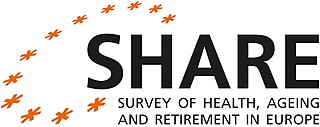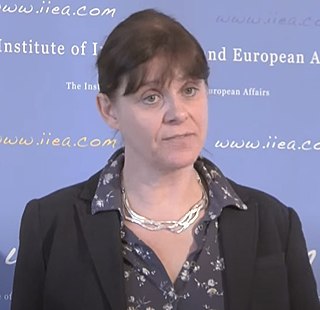Retirement is the withdrawal from one's position or occupation or from one's active working life. A person may also semi-retire by reducing work hours or workload.

Population ageing is an increasing median age in a population because of declining fertility rates and rising life expectancy. Most countries have rising life expectancy and an ageing population, trends that emerged first in developed countries but are now seen in virtually all developing countries. In most developed countries, the phenomenon of population aging began to gradually emerge in the late 19th century. The aging of the world population occurred in the late 20th century, with the proportion of people aged 65 and above accounting for 6% of the total population. This reflects the overall decline in the world's fertility rate at that time. That is the case for every country in the world except the 18 countries designated as "demographic outliers" by the United Nations. The aged population is currently at its highest level in human history. The UN predicts the rate of population ageing in the 21st century will exceed that of the previous century. The number of people aged 60 years and over has tripled since 1950 and reached 600 million in 2000 and surpassed 700 million in 2006. It is projected that the combined senior and geriatric population will reach 2.1 billion by 2050. Countries vary significantly in terms of the degree and pace of ageing, and the UN expects populations that began ageing later will have less time to adapt to its implications.
The Gerontological Society of America (GSA) is a multidisciplinary organization devoted to research and education in all aspects of gerontology: medical, biological, psychological and social.
The Health and Retirement Study (HRS) is a longitudinal survey of a representative sample of Americans over age 50 conducted by the Survey Research Center (SRC) at the Institute for Social Research (ISR) at the University of Michigan in Ann Arbor and supported by the National Institute on Aging (NIA). The study interviews approximately 20,000 respondents every two years on subjects like health care, housing, assets, pensions, employment and disability. The study is managed through a cooperative agreement between the NIA, which provides primary funding, and the ISR, which administers and conducts the survey. Beginning in 2012, HRS began adding genetic information from consenting participants to its database. The economic measures captured by the data in the HRS are regarded as being of very high quality.
Financial gerontology is a multidisciplinary field of study encompassing both academic and professional education, that integrates research on aging and human development with the concerns of finance and business. Following from its roots in social gerontology, Financial gerontology is not simply the study of old people but emphasizes the multiple processes of aging. In particular, research and teaching in financial gerontology draws upon four kinds of aging or "'four lenses" through which aging and finance can be viewed: population aging, individual aging, family aging, and generational aging. While it is problematic that "demography is destiny," demographic concepts, issues, and data play a substantial role in understanding the dynamics of financial gerontology. For example, through the lens of population aging, demography identifies the number of persons of different ages in cities and countries—and at multiple points in time. Through the lens of individual aging, demography also notes changes in the length of time—number of years lived in older age, typically measured by increases in life expectancy. From in its founding years in the beginning of the 21st century, one primary interest of Financial Gerontology has been on baby boomers and their relationships with their parents. The impact of these two kinds of aging on finance are reasonably apparent. The large and increasing number of older persons [population aging] in a society, no matter how "old age" is defined, and the longer each of these persons lives [individual aging], the greater the impact on a society's pattern of retirement, public and private pension systems, health, health care, and the personal and societal financing of health care. The focus on boomers illustrates also the other two lenses or "kinds" of aging. How boomers deal with the social, emotional, and financial aspects of their parents' aging is a central aspect of family aging. And how boomers may differ from their parents born and raised twenty to forty years earlier, and differ from their Generation X and Millennial children and grandchildren, are substantial aspects of generational aging.

The Survey of Health, Ageing and Retirement in Europe (SHARE) is a multidisciplinary and cross-national panel database of micro data on health, socio-economic status and social and family networks. In seven survey waves to date, SHARE has conducted approximately 380,000 interviews with about 140,000 individuals aged 50 and over. The survey covers 28 European countries and Israel.
The English Longitudinal Study of Ageing (ELSA) is a longitudinal study that collects multidisciplinary data from a representative sample of the English population aged 50 and older to look at all aspects of aging in England.
The Study on global AGEing and adult health (SAGE) is run by the World Health Organization. An objective for SAGE is to compile comprehensive longitudinal data on the health and well-being of adult populations and the ageing process across different countries, through primary data collection, secondary data analysis and cross-study collaborations.
The China Health and Retirement Longitudinal Study (CHARLS) is a longitudinal survey being conducted by the China Center for Economic Research at Peking University with Professor Yaohui Zhao of Peking University serving as Principal Investigator and Professors John Strauss of the University of Southern California and Albert Park of HKUST Institute for Emerging Market Studies serving as co-Principal Investigators.

Sarah Harper FRAI CBE is a British gerontologist, who established Oxford's Institute of Population Ageing, and became the University of Oxford's first Professor of Gerontology. She served on the Prime Minister's Council for Science and Technology between 2014 and 2017 and in 2017 was appointed Director of the Royal Institution of Great Britain. Sarah was appointed a CBE in 2018 for services to the Science of Demography.
The Mexican Health and Aging Study (MHAS), also known by its Spanish name, Estudio Nacional de Salud y Envejecimiento en México, ENASEM, is the first panel study of health and aging in Mexico. The first phase of MHAS was supported by a grant from the MHAS was supported by a grant from the National Institutes of Health/National Institute on Aging. The study was a collaborative effort among researchers from the Universities of Pennsylvania, Maryland, and Wisconsin in the U.S., and the Instituto Nacional de Estadística, Geografia e Informática.
SAVE is a representative data collection about private households’ saving behaviour in Germany. The survey was conducted in 2001 for the first time.
TARKI Social Research Institute is an independent research centre located in Budapest, Hungary. TARKI conducts applied socioeconomic research in social stratification, labour markets, income distribution, intergenerational transfers, tax-benefit systems, consumption and lifestyle patterns and attitudes in Hungary and, in the majority of its projects, in Europe. TARKI is closely embedded in international collaborations with major European academic partners in various research projects. Senior staff at TARKI all have PhDs with substantive and methodological interests and many hold professorial appointments at major universities. TARKI has its own fieldwork apparatus, capable of carrying out regular empirical surveys on social structure and on attitudes and of managing large scale international research. TARKI also carries out the Hungarian fieldwork of various high-quality international surveys.
The German Ageing Survey (DEAS) is a main source of information about ageing and old age as a stage of life in Germany. It is a nationally representative, cross-sectional and longitudinal survey of people in the second half of life . The comprehensive study of people in their mid- and older adulthood provides individual data for use both in social and behavioural scientific research and in reporting on social developments. The data is thus a source of information for political decision makers, the general public and for scientific research. The DEAS allows to form a comprehensive picture of life situations and life contexts of old and ageing people in Germany and to respond to current political and academic questions.
The Max Planck Institute for Social Law and Social Policy is a research facility located in Maxvorstadt, Munich, Bavaria, Germany.
The Irish Longitudinal Study on Ageing (TILDA) is a nationally representative longitudinal study of the population of Ireland aged 50 and above. TILDA aims to understand the health, social and financial circumstances of the older Irish population and how these factors interact. The study is led by Trinity College Dublin (TCD) in collaboration with a majority of the other principal academic institutions in Ireland. A wide range of experts from many disciplines have been involved from the outset in the development and execution of this study.
Aging has a significant impact on society. People of different ages and gender tend to differ in many aspects, such as legal and social responsibilities, outlooks on life, and self-perceptions. Young people tend to have fewer legal privileges, they are more likely to push for political and social change, to develop and adopt new technologies, and to need education. Older people have different requirements from society and government, and frequently have differing values as well, such as for property and pension rights. Older people are also more likely to vote, and in many countries the young are forbidden from voting. Thus, the aged have comparatively more, or at least different, political influence.

Axel Börsch-Supan is a German researcher, economist and director of the Munich Center for the Economics of Aging (MEA) at the Max Planck Institute for Social Law and Social Policy in Munich, Germany. He is Professor of Economics and Chair for the Economics of Aging at the Technical University of Munich. Additionally, he is Managing Director of SHARE-ERIC. An important field of his empirical research focuses on socio-political issues that are associated with economic aspects of demographic change and the aging of the population.
Dov Shmotkin is Professor Emeritus in the School of Psychological Sciences and Head of the Herczeg Institute on Aging at Tel Aviv University.

The SHARE Berlin Institute (SBI) is a social science research institute in Berlin, Germany. It was founded in 2022 by the Berlin Social Science Center (WZB), the German Institute for Economic Research (DIW), the university hospital Charité Berlin and the German Centre of Gerontology (DZA).




